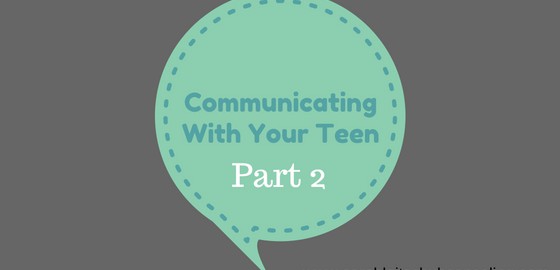In part one of this series, I shared some helpful tips for communicating with your teen. In this post, I will be sharing some reflection questions based off of the first post to help come up with a new strategy or approach to use in communicating with your teen about a challenging subject. The purpose of this exercise is to be more mindful about how we communicate with the teens in our lives. The result will hopefully be a more effective conversation with your teen, but I do not pretend this approach will make every conversation perfect.
It may be helpful to have a pen and paper handy as you read through this post.
Step One:
Identify a situation or topic that has been challenging to communicate with your pre-teen or teen about. I encourage you to explore whatever is challenging for you right now, or consider a topic that you anticipate needing to address soon. Examples of possible situations that you may explore. following family rules, curfew, dating, school performance, household chores.
Step Two:
Consider the following questions as you reflect on some ideas about how to change your communication with your pre-teen or teen about this situation.
- What are factors that have contributed to previous conversations (about any topic) with your pre-teen or teen that you experienced as successful? How can you apply the factors you identified to discussing this current situation?
- What have been your challenges in talking about this situation in the past? How can you work around these challenges?
- How has your child viewed your approach to communicating about this situation in the past?
- What time may the best to try to communicate with your teen about this situation?
- What are your emotions about this situation? How can you effectively manage your own emotions during communication with your child? What do you want to share with your child about how you are feeling about this situation?
- What language would you like to use? What language would you like to avoid?
- What types of questions would you like to ask? How do you make sure your questions come from a place of curiosity?
Step Three:
Reflect on your answers to the questions above and make a plan for how you would like to approach a conversation with your child about this situation/topic. Then go have the conversation or make a plan to have the conversation soon.
Happy Communicating.
Sarah
If you would like some extra support in communicating with your teen, please visit my Counseling Page or my Workshop Page for information about how my services may be of assistance.
